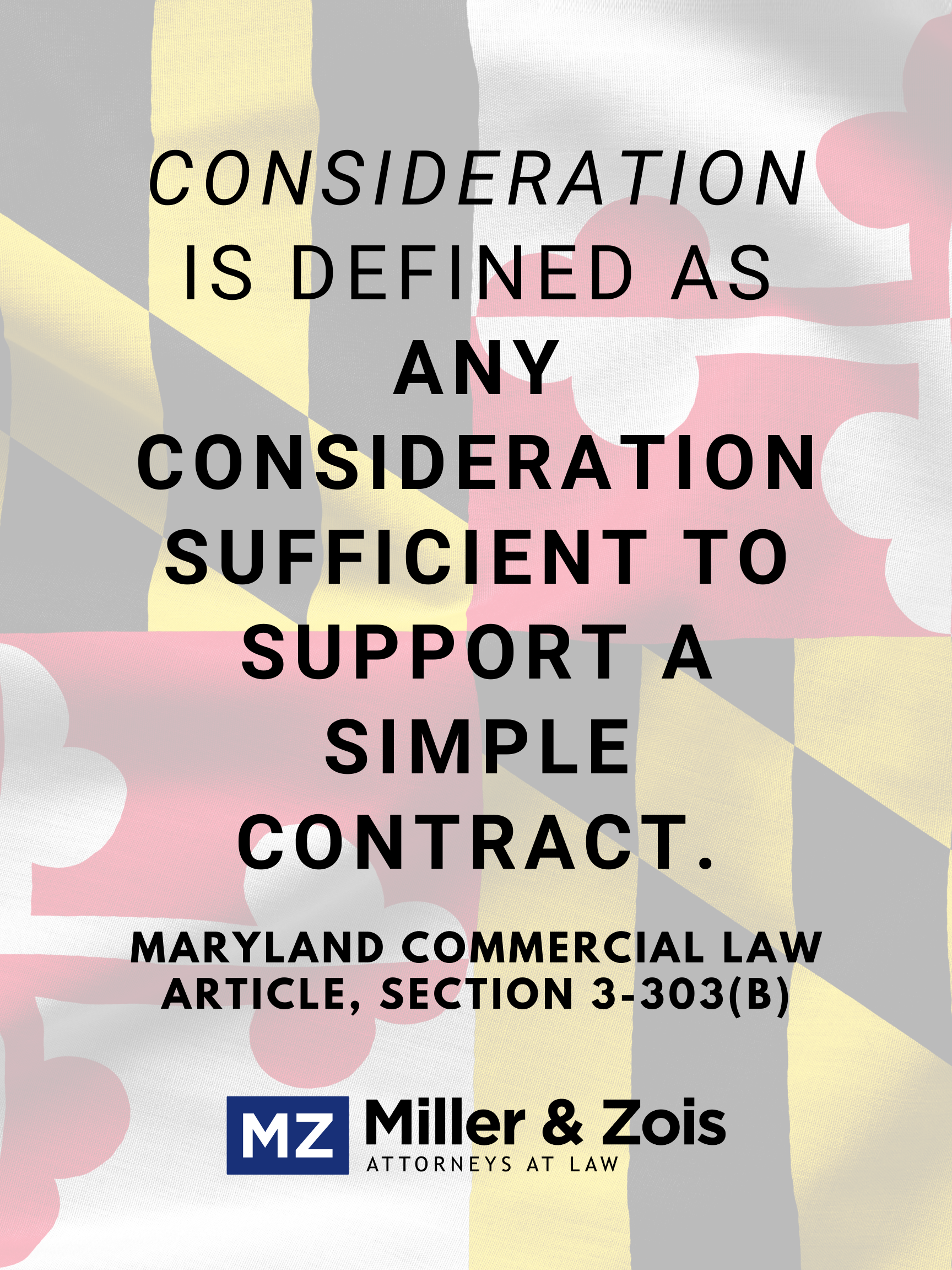Under Maryland law, a legally binding contract must be supported by consideration provided by both parties. Consideration is something of value that is bargained for and received by a promisor from a promise. In practical terms, this means both parties have to be giving up something for there to be a valid contract. Let’s do a quick example to make sure we are reading off the same page. You say you like my shirt. I say I’ll give it to you if you like it that much. Let me just wash it for you. I change my mind. We do not have a valid contract because you did not give or promise to give me anything of value. Let’s change it. You say you like my shirt. I say I’ll give it to you if you promise to drive me to the store to get myself a new one. That offer to drive me to the store is valid consideration because you now have a bargained-for exchange, albeit maybe an unfair one.
Maryland Law on Contract Consideration
Under Maryland Commercial Law Article, Section 3-303(b), consideration is defined as any consideration sufficient to support a simple contract. Like many states, Maryland courts will not get bogged down in how valuable the consideration was or whether the deal is fair. So unless there if foul play, Maryland courts will not inquire into the adequacy of value exacted for a promise so long as it has some value. Blumenthal v. Heron, 261 Md. 234, 274 A.2d 636 (1971). Even $1 in consideration may be sufficient to form a contract under Maryland law.
Maryland Law Does Not Require Explicit Consideration
Maryland law does not require consideration to be explicitly laid out in the contract. Courts will infer consideration from the context of the entire instrument or agreement. A Maryland court may also use parole evidence to uncover consideration. In fact, an admission or recital in a written contract that it was made for valuable consideration may assist in proving there was consideration for the contract.
Is Past Consideration Enough Under Maryland Contract Law?
Past consideration is a performed act or promise that was made before the new promise was made? Can that consideration be used to find a contract in the absence of consideration? The answer is generally no. Past consideration is not valid consideration because it was not a part deal. But human relationships are complicated and the law understands this. So there are three exceptions to his rule:
- when there is an honest dispute over the interpretation of the original contract and the modification represents an agreement or compromise between the parties to change the terms of the underlying contract and enter into a new contract
- the modification is needed because of unforeseen difficulties that were not contemplated by the original contract, or
- one party’s performance pursuant to the modification has been accepted by the other party.
Compromise of Dispute as Consideration Under Maryland Law
Sometimes, deals are done to make everyone happy to avoid future disputes. This usually involves giving a party something additional outside of the original agreement to make them happy and settle any future arguments. Do these agreements have adequate consideration? The answer generally is yes. A compromise of a dispute may be consideration for an accord and satisfaction for legitimate disputes made in good faith.
Why Do Maryland Contracts Require Legal Consideration?
Maryland contracts require legal consideration before a contract is formed because the law wants to enforce contracts, not promises. Courts do not want to enforce unilateral promises that do not rise to the level of an enforceable contract. So consideration is required to ensure both parties to the agreement incur a burden or obligation.
What Is a Contact Without Consideration Under Maryland Law?
A contract without consideration under Maryland law is nothing more than a broken promise. Maryland court do not encourage broken promises. But they are not legally enforceable without a contract.
Adequate Consideration Settlements and Verdicts
YEAR / STATE
CASE / INJURY SUMMARY
RESULT
An attorney agreed to provide legal services for monetary compensation. His client refused to pay him the total amount due, which caused monetary damages. The attorney alleged breach of contract and inadequate consideration against his client. The client denied the allegations. He argued that the attorney’s acceptance of partial payment barred the lawsuit. The client also argued that their contract was too ambiguous to legally obligate him to pay the attorney fees. This case settled for $10,600.
$10,600 – Settlement
2012 – Oklahoma
A woman created a living trust. She and her husband were its co-trustees. Her son moved into their home and cared for her husband. After her husband died, the woman named her son a co-trustee. She did this with the understanding that he would care for her for the rest of her life. The woman provided her son a $50,000 loan from the trust. It was to be paid on demand. Three years later, her son told her that her daughter would provide care instead of him. After moving in with her daughter, the woman found out that her son spent the trust money on personal expenses such as new cars and converted trust property. She then removed him as a co-trustee. Three months later, the woman also requested payment for the loan. Her son failed to pay it back. The woman then filed suit. She alleged breach of contract against her son. He admitted failing to pay her back but denied liability. He argued that he rightfully owned her home. The judge found that the man breached his duty by failing to provide adequate consideration. He ordered that the woman receive compensation that totaled $1,401,000.
$1,401,000 – Verdict
$200,000 – Settlement
 Maryland Lawyer Blog
Maryland Lawyer Blog


